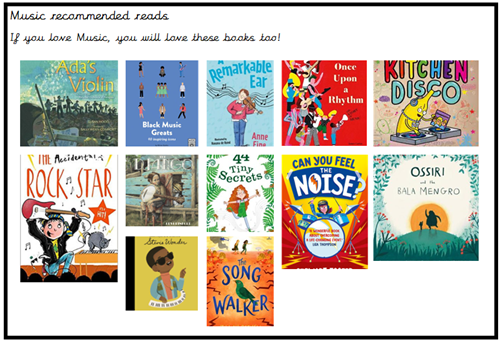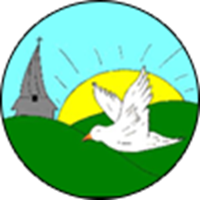Welcome
Welcome to our Music page.
Music is a universal language that embodies one of the highest forms of creativity. As pupils progress, they should develop a critical engagement with music, allowing them to compose, and to listen with discrimination to the best in the musical canon. (The National Curriculum)
[Schools should] offer a broad and balanced [Music] curriculum (Ofsted 2021)
Intent
At Cleobury Mortimer Primary School, it is our aim to offer all children a broad and balanced music curriculum that exposes them to a range of different musical styles, allows them to reflect and provides the opportunity for them to express themselves. We aim to enable all of our pupils to feel that they are musical and to help them to develop a life-long love of music. We intend to facilitate the learning of new, and development of existing skills, knowledge and understanding that children need in order to become confident performers, composers and listeners.
We recognise the positive impact that the study of music and the arts can have on a pupil (Education Endowment Foundation 2021). We recognise that participation in the arts can have a positive impact on academic outcomes in other areas as well as wider benefits such as more positive attitudes to learning and increased well-being.
We intend to enable all children to have access to high quality music lessons, regardless of their socioeconomic background. We aim to provide children who may not have previously had the opportunity to learn a musical instrument the experience to do so. Removing this barrier will help to reduce the disadvantage gap and will provide pupils access to a rich and stimulating arts education (Education Endowment Foundation 2021).
It is our intent that all pupils, without exception, will be able to enjoy music lessons in a positive and supportive environment (Education Endowment Foundation 2020).
Our curriculum sets out clear pathways and routes for progression that allow children to develop the three pillars of musical education (Ofsted 2021).
In addition, it is our aim for all children to develop an understanding of the history of music and the cultural context of the music that they listen to. This will expose children to music which, for many, will be outside of their daily experiences, thus developing cultural capital (Ofsted 2019).
It is our intent to develop transferable skills which can be used in other aspects of study and wider life. Through our curriculum, children will develop their team-working, leadership, creative thinking, problem-solving, decision-making, presentation, and performance skills. These skills are vital to children’s development as learners and have a wider application in their general lives outside and beyond school.
The Kapow Music scheme of work will prepare pupils to meet the end of key stage attainment targets outlined in the national curriculum. Whole class instrumental lessons will enable pupils to become proficient in at least one musical instrument, will provide opportunities for them to perform and express themselves, and will introduce them to different ways of representing and reading music.
Implementation
To achieve our goals, our Music curriculum is based on the Kapow scheme of work. Kapow’s scheme takes a holistic approach to music, in which the individual strands below are woven together to create engaging and enriching learning experiences. Exploring five key strands will enable pupils to develop a well-rounded understanding of musical concepts:
- Performing
- Listening
- Composing
- The history of music
- The inter-related dimensions of music
Each five-lesson unit combines these strands within a cross-curricular topic designed to capture pupils’ imagination and encourage them to explore music enthusiastically. Over the course of the scheme, children will be taught how to sing fluently and expressively, and play tuned and untuned instruments accurately and with control. They will learn to recognise and name the interrelated dimensions of music – pitch, duration, tempo, timbre, structure, texture and dynamics – and use these expressively in their own improvisations and compositions.
The Kapow scheme follows the spiral curriculum model where previous skills and knowledge are returned to and built upon. In each lesson, pupils will actively participate in musical activities drawn from a range of styles and traditions, developing their musical skills and understanding of how music works. Lessons incorporate a range of teaching strategies from independent tasks, paired and group work as well as improvisation and teacher-led performances. Lessons are practical and incorporate movement and dance elements, as well as making cross curricular links with other areas of learning.
Music lessons in EYFS and KS1 will be delivered in the form of units from the Kapow scheme, whilst pupils in KS2 will study several Kapow units as well as taking part in specialist whole class instrumental lessons, delivered by an expert from Shropshire Music Service, These sessions will run weekly for more than 1 term. Children will be encouraged to look after their instrument, learn how to read appropriate notation and develop an understanding of how to play the instrument as well as developing their personal and collaborative performance skills. We value to importance of expert subject knowledge; we believe that working with an expert to deliver whole class instrumental lessons will provide an invaluable experience and help children to develop their musical understanding considerably.
The progression of skills and knowledge map shows the skills that are taught within each year group. Each unit will build on skills developed in previous units. Liaison with out specialist music teacher will ensure that the skills set out in the Kapow scheme are taught across those years that receive whole class tuition to ensure the children are proficient in the skills needed to draw upon for the next unit of study and to help them develop as musicians.
Pupils will regularly receive the opportunity to perform in front of an audience. This will take place in the form of a Christmas performance, performances in the community, performances in assemblies and a joint Shropshire Gateway Educational Trust Concert in the Summer term. We will actively promote wider opportunities involving music. Our relationship with the Shropshire Music Service will help children to access extracurricular activities such as the Stompers ensembles. After school clubs will allow children who are enthusiastic about music to further pursue their passions and interests.
‘Ensuring that classroom music provision is high quality is essential’ (Ofsted 2022). We value the importance of quality first teaching and recognise the need for teachers to have a strong subject knowledge in music. Ongoing CPD is provided to teachers in the form of teacher videos for each music unit throughout the scheme. Teachers of classes who receive whole class instrumental tuition will take part in the music lessons and develop their subject knowledge through learning a musical instrument alongside the class.
We will strive to remove barriers to learning for pupils with SEND. Adopting a positive and proactive approach will ensure that children with SEND are able to express themselves and take an active part in lessons. Explicit instructions and scaffolding will enable all pupils to achieve and succeed in music.
Impact
The impact of our music curriculum can be constantly monitored through both formative and summative assessment opportunities. Each lesson in the Kapow scheme includes guidance to support teachers in assessing pupils against the learning objectives and at the end of the unit there is often a performance element where teachers can make a summative assessment of pupils’ learning. Knowledge organisers for each unit support pupils by providing a highly visual record of the key learning from the unit, encouraging recall of practical skills, key knowledge and vocabulary.
Summative assessment will take place at the end of each unit and will be recorded on the Cleobury Mortimer Primary School foundation subject assessment template. This will help to identify any gaps in skills and knowledge that can be addressed before the next unit or when the skill is revisited further on in the scheme. These gaps can be addressed to ensure that children are proficient in the skills required to meet their objectives.
After the implementation of our curriculum, pupils should leave primary school equipped with a range of skills to enable them to succeed in the next stage of their education and to be able to enjoy and appreciate music throughout their lives. Pupils will leave school with proficiency in at least one musical instrument and will be prepared with the skills to explore this musical instrument further via additional lessons or by joining a community group.
The expected impact of our curriculum is as follows:
- Be confident performers, composers and listeners and will be able to express themselves musically at and beyond school.
- Show an appreciation and respect for a wide range of musical styles from around the world and will understand how music is influenced by the wider cultural, social, and historical contexts in which it is developed.
- Understand the ways in which music can be written down to support performing and composing activities.
- Demonstrate and articulate an enthusiasm for music and be able to identify their own personal musical preferences.
- Meet the end of key stage expectations outlined in the National Curriculum for Music.
This statement is based off the latest evidence and research. Sources used:
Department for Education (2014) The National Curriculum
Education Endowment Foundation (2020) Special Educational Needs in Mainstream Schools.
Education Endowment Foundation (2021) Arts Participation
Department for Education (2021) Model Music Curriculum: Key Stages 1 to 3
Ofsted (2019) Education Inspection Framework
Ofsted (2022) The Power of Music to Change Lives
Ofsted (2021) Research Review Series: Music
(Updated January 2023)




